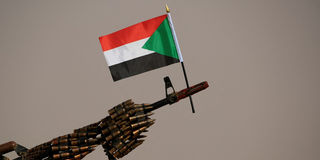Premium
Sudan's RSF conducts first drone attack on Port Sudan, army spokesperson says

A Sudanese national flag is attached to a machine gun of Paramilitary Rapid Support Forces (RSF) soldiers.
Sudan's paramilitary Rapid Support Forces (RSF) carried out a drone attack on a military air base and other facilities in the vicinity of Port Sudan Airport, a Sudanese army spokesperson said on Sunday, in the first RSF attack to reach the eastern port city.
No casualties were reported from the attacks, the spokesperson said.
The RSF has not commented on the incident.
The RSF has targeted power stations in army-controlled locations in central and northern Sudan for the past several months but the strikes had not inflicted heavy casualties.
The drone attack on Port Sudan indicates a major shift in the two-year conflict between the Sudanese army and the RSF. The eastern regions, which shelter a large number of displaced people, had so far avoided bombardment.
The army has responded by beefing up its deployment around vital facilities in Port Sudan and has closed roads leading to the presidential palace and army command.
Port Sudan, home to the country's primary airport, army headquarters and a seaport, has been perceived as the safest place in the war-ravaged nation.
In March, the army ousted the RSF from its last footholds in Khartoum, Sudan's capital, but the paramilitary RSF holds some areas in Omdurman, directly across the Nile River, and has consolidated its position in west Sudan, splitting the nation into rival zones.
The conflict between the army and the RSF has unleashed waves of ethnic violence and created what the United Nations calls the world's worst humanitarian crisis, with several areas plunged into famine.
The war erupted in April 2023 amid a power struggle between the army and RSF ahead of a planned transition to civilian rule. It ruined much of Khartoum, uprooted more than 12 million Sudanese from their homes and left about half of the 50 million population suffering from acute hunger.
Overall deaths are hard to estimate but a study published last year said the toll may have reached 61,000 in Khartoum state alone in the first 14 months of the conflict.


